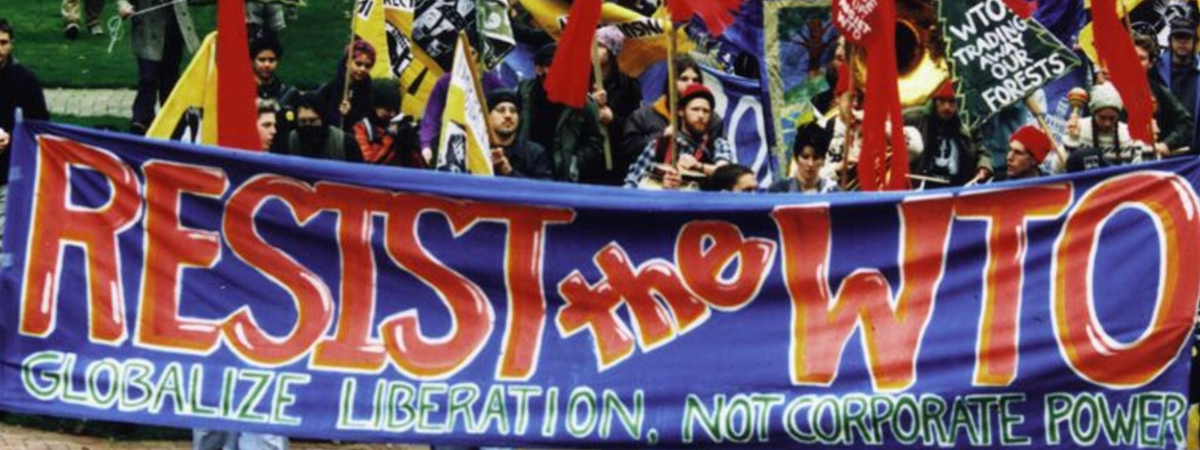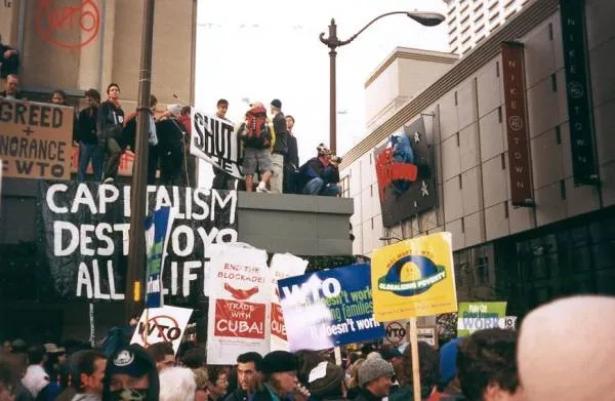It’s been 25 years since the streets of Seattle echoed with calls for fair trade, justice, and accountability during the WTO protests. In the closing days of November 1999, workers, union members, environmentalists, students, and community leaders stood side by side to challenge global trade policies that prioritized corporate profits over the rights of workers, the health of our communities, and the well-being of our planet. This powerful display of solidarity put Seattle on the global map as a leader in the fight for worker-centered trade policy—and it inspired a generation to rethink our economic system.
As we approach this anniversary, the need for trade justice that centers workers is more urgent than ever. With recent election results still settling, we are reminded that the challenges we face today—rising economic inequality, corporate-driven trade policies, and environmental degradation—are interconnected. The lessons from 1999 still ring true: when workers stand together, in solidarity with allies across sectors, we can shape a future where trade policies serve people, not just profit.
This December, to mark the 25th anniversary of the WTO protests, the Washington Fair Trade Coalition and partner organizations are hosting a series of events that invite the labor community and broader public to reconnect with this legacy. These events, which include discussions with veteran labor organizers, virtual panels, and educational tours, will reflect on the gains made, examine where we stand today, and empower individuals to join the ongoing movement for economic and social justice.
The Washington Fair Trade Coalition’s main event, “Seattle’s Trade Legacy: A Journey Through Protest & Power,” will take place virtually on December 3rd. This event will bring together some of the original labor leaders and activists who helped organize the 1999 protests to reflect on lessons learned and discuss the issues still at stake for workers today. Topics will include economic inequality, workers’ rights, environmental sustainability, and the growing influence of Big Tech. The conversation will highlight how these issues continue to impact workers and the strategies we need to mobilize a new generation of union members and advocates.
Today’s economic and trade landscape is even more complex and fraught than it was in 1999. The unchecked power of multinational corporations, environmental degradation, and worsening income inequality demand that we revisit the critiques raised during those protests. We must continue to ask tough questions: Who really benefits from current trade policies? How are workers—especially in marginalized communities—impacted by trade agreements? How can we reshape policies to ensure fair, equitable, and sustainable outcomes for workers across all sectors?

Photo: Washington Fair Trade Coalition
These events aren’t just an opportunity to reflect on the past—they’re a call to action. Now more than ever, we need an engaged, informed labor movement ready to challenge the economic status quo. By gathering to honor the spirit of the WTO protests, we hope to empower the labor community with practical tools and renewed inspiration to advocate for a fairer, more transparent trade system that values people, not just profit.
Join us in commemorating Seattle’s legacy of labor organizing for fair trade. Whether you’re a seasoned union member or new to the movement, these events offer a chance to learn, connect, and stand in solidarity for just and accountable trade policy. Together, we can continue the work started 25 years ago and build a future where economic justice is a reality for all workers.
For more details on the events, visit the Washington Fair Trade Coalition’s website and RSVP. Let’s honor the legacy of the 1999 protests by reigniting our commitment to a worker-centered, just global economy.
Julie Bouanna is the Executive Director of the Washington Fair Trade Coalition.
A service of the Washington State Labor Council, AFL-CIO (WSLC) and its affiliated unions, The STAND was launched on May Day 2011 to feature news about — and for — working people. Its reports and opinion columns focus on creating and maintaining quality jobs, joining together in unions, improving our families’ quality of life, and promoting public policies that will restore shared prosperity.


Spread the word